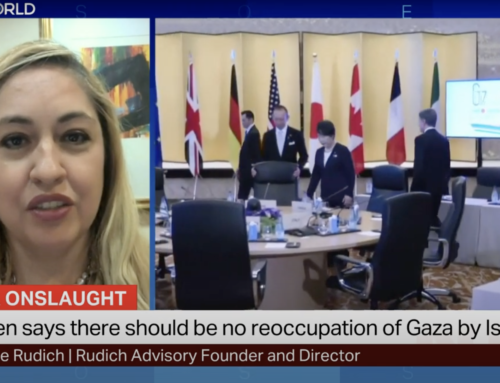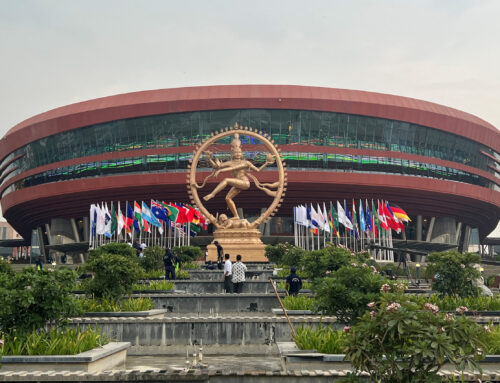Ensuring a Smooth Transition from Hangzhou to Hamburg
Germany will take over the G20 presidency from China on 1 December 2016 and will host the G20 summit on July 7 and 8, 2017, in the cosmopolitan city of Hamburg.
China had adopted a very ambitious theme for its 2016 summit in Hangzhou: “Towards an innovative, invigorated, interconnected and inclusive world economy.” For the Hangzhou Summit, Germany worked to ensure that the G20 had positive outcomes in key policy areas covered under the summit themes while also looking to push forward additional priorities for its domestic economy. Germany further indicated that it would carry the significant initiatives made at the Hangzhou Summit forward to Hamburg.
Given the current state of world affairs, at Hangzhou, the G20 leaders needed to come together to reignite global economic growth to meet the 2% additional growth by 2018 target they set at the G20 Brisbane Summit in 2014 and to promote market confidence and financial stability. World events such as Brexit, political uncertainty with the coming U.S. elections, and the slowdown in the Chinese economy, combined with allegations of grand-scale corruption rocking countries such as Brazil, continued to have massive destabilizing effects on global markets. The G20 needed to flex its political muscle as the premier forum at the international level to address both geopolitical and systemic issues that affect the global economy. In particular, the G20 needed to focus on countering the protectionist sentiment sweeping much of the world.
It was anticipated that at Hangzhou Germany would seek commitments with other countries in the following areas:
-
Terrorism: the continued atrocities being committed by terrorist groups such as ISIS/ISIL, al Qaeda, and Boko Haram and the spread of terrorist ideologies and lone-wolf attacks remain major threats, not just with regard to national security but also to the global economy. Germany was expected to seek agreement in the fight against terrorism and terrorist financing, which were addressed in the Hangzhou communiqué. The G20 leaders condemned terrorism and reaffirmed solidarity in the fight against terrorism. The G20 pledged to tackle all sources of terrorist financing, including through the effective automatic exchange of information, freezing of terrorist assets and criminalization of terrorist financing. They also called for the implementation of the standards set by the Financial Action Task Force (FATF) and United Nations Security Council Resolution 2253 detailing financial and economic sanctions against al Qaeda and Daesh. They called on the FATF to reflect by March 2017 on how it could strengthen its capacity.
-
Migration and the refugee crisis: Germany continues to play a leading role since the 2015 Antalya Summit in addressing the refugee crisis by taking in more than 1 million displaced persons affected by the violence in the Middle East. The number of refugees, migrants, and displaced persons remains at its highest since the Second World War. Germany was expected to seek agreement from other G20 members to take in displaced persons as well as to bolster financial and technical assistance. The G20 addressed the issue at Hangzhou, but fell flat on getting buy-in for other countries to take in displaced persons. The G20 invited all countries to scale up assistance, “according to their individual capacity,” and international organizations to enhance their capabilities to help affected countries and strengthen the contribution of development assistance to host communities.
-
Trade liberalization and global investment: German exports account for almost half of its gross domestic product. The World Trade Organization recently highlighted the fact that the top 20 global economies have introduced more than 1,200 new trade barriers. Commitments to enhance trade liberalization, free trade agreements with other trading blocs and global investment in infrastructure were key, especially in light of the advent of Brexit, as the United Kingdom is one of its largest importers. Germany was expected at Hangzhou to stress the need to counter protectionist policies. The G20 delivered by committing to “enhance an open world economy by working towards trade and investment facilitation and liberalization.” Leaders also pledged to “standstill and rollback of protectionist measures” until the end of 2018. Additionally, with regards to Brexit, the G20 said it hoped to see the UK as “a close partner of the EU.”
-
Gender equality: In September 2015 at a G7 dialogue forum in Japan German chancellor Angela Merkel said that women must play a bigger role in policy, business, and society and that there would be “no success without equality.” She was expected to echo this sentiment and look for support in making a commitment to promote gender equality at Hangzhou. But this was only lightly touched upon as part of the inclusiveness theme, with the G20 indicating that it would work to ensure that economic growth served all people and that the benefits of the so-called New Industrial Revolution extended to all, including women. The leaders supported policies to encourage firms, particularly “women and … women-led firms” to take full advantage of global value chains.
-
Tax, transparency, and corruption: There has been a strong push by German finance minister Wolfgang Schaüble to obtain a tax on financial transactions in order to tax high-frequency traders and intermediaries. With the ongoing fallout from the
Panama Papers and the EU finding calling for Apple to repay the Irish government €13 billion in tax revenues, Germany was expected to seek continued support for the work of the Organisation for Economic Co-operation and Development (OECD) in the area of automatic exchange of information, tax transparency, and BEPS, in addition to supporting global anti-corruption initiatives. The G20 delivered in this regard.
For a successful transition from the 2016 G20 Hangzhou Summit to the 2017 Hamburg Summit, Germany must collaborate with its Chinese partners through the G20’s troika system of outgoing, current and incoming hosts, set up to ensure continuity. During a visit to China in June, Merkel said “We are very interested in working with China in this process. Germany will host next year’s G20 summit. This is why we want to carry parts of the agenda forward, thus creating close cooperation.”
China and Germany issued a joint declaration in June in which they indicated that they wanted to:
-
Intensify coordination and cooperation in macroeconomic policy;
-
Fulfill their growth potential through structural reforms, innovation, and other approaches;
-
Embrace opportunities coming out of the 4th industrial revolution and digital economy; and
-
Promote international trade and investment.
They also intend to further develop global governance, address climate change and tackle other core international challenges.
Following on from the ambitious four “I’s” theme of the G20 Chinese presidency, Germany’s G20 presidency will need to maintain the momentum from the Hangzhou Summit to fight the forces of protectionism, unilateralism and nationalism and other geopolitical factors that are threatening the global economy. These include health, well beyond the brief attention paid to antimicrobial resistance at Hangzhou; the refugee crisis; terrorism and radicalization; the development of an open economy; and the implementation of the 2030 Agenda for Sustainable Development. At Hangzhou, Germany’s Angela Merkel and India’s Narendra Modi also highlighted that there is nothing that erodes public confidence in our governance more than tax evasion and corruption. It is therefore anticipated that Merkel will also add tax transparency, BEPS, and corruption at Hamburg.
More specifically, the Hangzhou communiqué stated that the G20 would work in 2017 on the following issues:
-
Prepare a list of non-cooperative jurisdictions that have not implemented agreed standards on tax transparency;
-
Improve public and private sector transparency, implement zero-tolerance against corruption, ensure there are “zero loopholes in our institutions and zero barriers in our actions” and endorse the 2017-2018 Anti-Corruption Plan;
-
Manage excess steel capacity via a newly formed Global Forum;
-
Develop employment plans to achieve G20 goals on youth employment and female labour;
-
Develop concrete action on forced displacement and examine migration;
-
Address terrorist financing via the FATF; and
-
Report back on antimicrobial resistance as a threat to public health.
Key to success is two things that Germany does rather well: play a leading role in setting the global agenda and act as a stabilizing global force through multilateral engagement at various international fora. Germany is in a unique position as a member of the G7, G20, United Nations, OECD, and the European Union to orchestrate agreement among multiple actors with competing interests at the summit it will host the summit in 2017 and help ensure that Brexit does not disrupt market confidence, financial stability, and trust.
4 October 2016
http://www.g7g20.utoronto.ca/comment/161004-rudich.html
Originally published on G20 Research Group
Download “Ensuring a Smooth Transition from Hangzhou to Hamburg G20Hangzhou.pdf”
Ensuring-a-Smooth-Transition-from-Hangzhou-to-Hamburg_G20Hangzhou_04Oct2016.pdf – Downloaded 920 times – 526 KB




